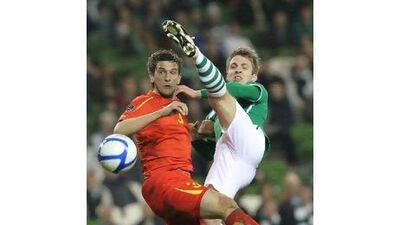Arsenal would not have got a penny in compensation from France or Wales if Samir Nasri or Aaron Ramsey had been injured paying for their national teams at the weekend. Yet the London club would have got a tidy insurance payout had Jack Wilshere picked up an injury marshalling England's midfield.
The English Premier League side Wolverhampton Wanderers, meanwhile, will, according to their chief executive, receive "diddly squat" in compensation for the knee injury sustained by Kevin Doyle, their £6.5 million (Dh38,238m) striker, while playing for the Republic of Ireland on Saturday, which is likely to see him miss the rest of the season as his team fight relegation.
Such are the bizarre vagaries and inconsistencies of injury insurance and compensation in football. No wonder, then, that Europe's top clubs want changes from Fifa, the game's world governing body.
Most national sides do not insure players against injury because, under Fifa's rules, they do not have to. Instead, Fifa makes clubs foot the bill. Not only must clubs release players for national duties, they must insure them against injury and accidents while they are away and continue to cover their wages when players return limping from national matches and training camps.
That is like being obliged to lend your car to a friend and being forced to pay the repairs if he slams it into a wall.
"It's a very abnormal situation," said Michele Centenaro, the general secretary of the European Club Association (ECA) that represents nearly 200 of the continent's leading clubs.
The ECA wants Fifa instead to take out a collective insurance that would pay clubs compensation when players return injured from national duty, helping to cover their wages — which these days are often substantial — while they are sidelined.
Centenaro said such a measure could help thaw the sometimes fraught relations between national teams and the clubs they rely on to lend them players.
"It's not really about money, it's about the principle," he said in a telephone interview. "It would release tensions and relax situations when it comes to calling players and clubs releasing players. We have difficulty to understand how there cannot be an easy solution."
Players are proud to represent their countries. A national call-up is prestigious for players' clubs, too. But it does not seem fair that they solely should have to pay for that honour.
Jean-Michel Aulas, the president of French side Lyon, suggests clubs could dig in their heels against national demands and "no longer accept the release of players systematically" if a solution is not found.
A collective insurance scheme would be "nothing more than logical and normal," Centenaro said more diplomatically.
Another of the current system's flaws is that it is unevenly applied.
England's Football Association (FA) does insure against player injury, but that makes it one of the few. The FA opts to do so "because of our relationship with the clubs; we are borrowing their assets" and because it is lucky enough to be able to afford such coverage, said Alex Horne, the general secretary.
The FA's insurance pays up to £100,000 per week, for up to 100 weeks, to clubs to help cover their wages when players are hurt on England duty, Horne said.
That means that if Aaron Lennon misses games for Tottenham Hotspur, who are heavily committed in the Champions League and Premier League, with the hamstring injury that forced him to withdraw from the England squad, then at least his club should see some money.
France, however, will not compensate Chelsea or Arsenal if Florent Malouda or Nasri got hurt last night against Croatia. Like the English FA, the French federation used to have insurance. But it stopped paying the premiums a few years ago, said Bernard Desumer, the federation treasurer.
Because clubs are supposed to insure their players, even when they are away with the national team, "I said to myself we are wasting money," Desumer said.
The Republic of Ireland are another example of a federation that does not pay.
"Unlike England and Scotland the Republic of Ireland don't offer insurance or compensation for players who get injured," Jez Moxley, the Wolves chief executive, said. "Fifa's guidelines do not require them to do so. The clubs have to take out insurance to protect their players if they want to.
"Kevin [Doyle] has gone away, done his best for his country, and was playing well, setting up the first goal, got injured and we will continue to pay his wages and get no compensation at all for him."
Wales also have no cover so Arsenal were hoping that Ramsey, their young midfielder, emerged unscathed from last night's match for the Welsh Under 21 team against Andorra.
Philip Pritchard, the Wales FA president, said his organisation is not wealthy enough to pay compensation to clubs and could not afford insurance if the rules were changed.
"It would kill a small association like us," he said. "The lifeblood of the small countries would be eliminated."
Both Fifa and Uefa, football's governing body in Europe, point out that clubs do get compensation for releasing their players for the World Cup and European Championships.
In all, those two bodies say they will be sharing a total of US$208 million (Dh763,973m) with clubs from the World Cups of 2010 and 2014 and the Euros of 2008 and 2012. Part of that money is meant to help cover clubs' insurance payments.
One possible alternative, at least for World Cups, might be to put some of the shared-out Fifa payment from 2014 into a collective insurance fund, said Fifa secretary general Jerome Valcke.
His Uefa counterpart, Gianni Infantino, said a collective insurance system is feasible but is "probably quite expensive".
"It's clear that we need to look at all this closely," he said. "It's clear that we need to discuss it."
* Associated Press

